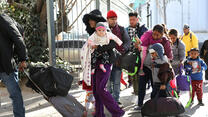Key focus areas
This November, American voters will decide the direction of the country's future for the next four years.
These pressing issues represent an opportunity for American leadership on:
Seeking asylum is a legal right enshrined in U.S. and international law. Policies enacted under the current and previous administrations have obscured this right and presented a series of challenges to asylum seekers on the road to safety.
Evidence shows that deterrence policies don’t work. They create unpredictable and chaotic movements of people, enrich smugglers, and fail to achieve any meaningful long-term impact on arrival numbers. Deterrence policies, like Title 42 and the “Asylum Ban”, do not significantly deter people from arriving to the border—however, they push people into more dangerous situations.
The IRC urges candidates and elected officials to work with civil society groups to strengthen protection and asylum systems. It is essential to implement policies that guarantee the integrity of displaced people, regardless of their nationality or status and reaffirm America’s long held, bipartisan commitment to welcoming refugees and asylum seekers.
Refugee resettlement offers a secure and proven way to protect the world’s most vulnerable populations, including those fleeing conflict, persecution and disasters. In the U.S., refugees have enriched communities by contributing their skills and experiences, embodying the nation's long-standing values of refuge and progress.
The U.S. Refugee Admissions Program (USRAP) has been a vital bipartisan initiative for decades, ensuring that those in need of protection find safety and hope.
As global displacement surpasses 120 million, maintaining robust resettlement infrastructure is more critical than ever. Welcoming refugees is not only a moral imperative but also a strategic advantage, enhancing U.S. foreign policy, national security and global stability.
The U.S. must continue its leadership in providing durable solutions to those displaced worldwide.
More than 360 million people worldwide are in need of humanitarian assistance, including in places like Ukraine, Sudan and the occupied Palestinian territory.
The U.S. has a long history of strong bipartisan support for humanitarian aid that has helped alleviate suffering while cost-efficient for taxpayers. In April 2024, the U.S. passed a $9 billion global humanitarian aid package to provide support to crisis-affected communities around the world. While humanitarian assistance accounts for a mere 1% of the U.S. budget, it plays a critical role in safeguarding national security and rallying the international community to break the cycle of crisis.
The US must continue to leverage its influence within the international community to develop better, bolder solutions fit for people affected by the world’s most challenging crises.
Learn more about the IRC's work
No matter who is president, the IRC will help families through each step of the resettlement journey, from cultural orientation all the way through starting a thriving business. Watch this video to learn more.

The IRC helps families like Yuliia’s reach safety and integrate into their new communities.We needed a safe place for our kids. In Ukraine, it was not safe…my daughter was 5 years old and I was seven months pregnant… We moved to [the U.S.], to be in a safe place. For our kids to be safe.YuliaaMother, refugee, and IRC client





